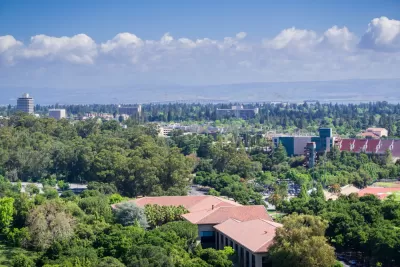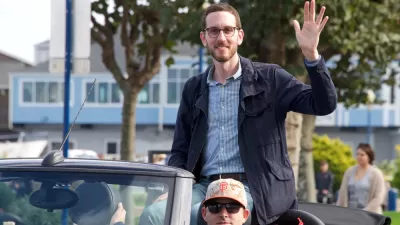The proposed legislation would open up cities like Palo Alto to higher-density housing.

Liam Dillon reports on Senate Bill 50, the big bill transit oriented development bill designed to address California's housing crisis by easing development restrictions on transit corridors all over the state. "Sen. Scott Wiener’s Senate Bill 50 aims to spur home building by requiring local governments to relax construction restrictions near mass transit, and it contains a separate provision that would force wealthy communities near employment centers to allow apartments where only single-family homes are currently permitted, regardless of whether they’re close to rail or major bus lines."
Palo Alto is one city that would see drastic changes, with construction of apartment buildings in neighborhoods where expensive single-family homes are now the norm. Local officials and residents are not welcoming the prospect, and they say the focus should be on limiting the job growth that is bringing in too many new, high-paid residents that the city cannot accommodate.
"But others believe the real issue is that Palo Alto residents want to prevent more people from living in their community," notes Dillon. Housing advocates say that Palo Alto has rejected proposed multiunit projects in the past, and the city has a long history of developing single-family neighborhoods that were only available to whites. Wiener says his bill will increase housing in communities across the state but also make up for the inequitable development of the past.
FULL STORY: California housing bill targeting wealthy cities could rezone nearly all of Palo Alto

Study: Maui’s Plan to Convert Vacation Rentals to Long-Term Housing Could Cause Nearly $1 Billion Economic Loss
The plan would reduce visitor accommodation by 25,% resulting in 1,900 jobs lost.

North Texas Transit Leaders Tout Benefits of TOD for Growing Region
At a summit focused on transit-oriented development, policymakers discussed how North Texas’ expanded light rail system can serve as a tool for economic growth.

Why Should We Subsidize Public Transportation?
Many public transit agencies face financial stress due to rising costs, declining fare revenue, and declining subsidies. Transit advocates must provide a strong business case for increasing public transit funding.

How to Make US Trains Faster
Changes to boarding platforms and a switch to electric trains could improve U.S. passenger rail service without the added cost of high-speed rail.

Columbia’s Revitalized ‘Loop’ Is a Hub for Local Entrepreneurs
A focus on small businesses is helping a commercial corridor in Columbia, Missouri thrive.

Invasive Insect Threatens Minnesota’s Ash Forests
The Emerald Ash Borer is a rapidly spreading invasive pest threatening Minnesota’s ash trees, and homeowners are encouraged to plant diverse replacement species, avoid moving ash firewood, and monitor for signs of infestation.
Urban Design for Planners 1: Software Tools
This six-course series explores essential urban design concepts using open source software and equips planners with the tools they need to participate fully in the urban design process.
Planning for Universal Design
Learn the tools for implementing Universal Design in planning regulations.
Ascent Environmental
Borough of Carlisle
Institute for Housing and Urban Development Studies (IHS)
City of Grandview
Harvard GSD Executive Education
Toledo-Lucas County Plan Commissions
Salt Lake City
NYU Wagner Graduate School of Public Service




























